Why I Haven’t Written Any of My Posts
The other night, when I first attempted to write this post, I was shocked to find that the last “real” post I’d written (the nutty Baudrillard in the Time of COVID/Baseball is Back! experiment), posted on July 29th. July! That was almost three months ago. Where did the time go? And why haven’t I written anything since then?
(That isn’t quite true. I wrote an overly personal Medium post that took oh, so much out of me. But that’s not a post about books—really—so I’m not really counting it. It’s also not to blame for the Three Percent radio silence.)
Related: I haven’t been reading many new translations lately. I started September on fire—declaring, internally and to my therapist, that September 1st marked the end of Sad Coronafucked 2020 Chad—but totally lost the drive. To be fair, I’ve been reading a lot of unpublished manuscripts, samples from ALTA pitch sessions, and A Frolic of His Own (more on that below), but I haven’t carved out the necessary time to read, reflect, and come up with a loopy/insane/semi-intriguing frame to write about these.
Which is killing me! It’s been said many times on this site that these posts serve a dual (triple?) purpose: to entertain and inform about books in translation, and to give me two-three hours a week in which I just have fun. Fun thinking just to think, writing with the hopes of being heard. But how can you have fun in October 2020? Like, pure unbridled fun? This might be a Chad problem, but when I think about letting go, living in the moment, experiencing the rush of joy that was possible before the world really fell apart, I feel kind of guilty. There’s so much sadness and frustration and anger in the world—it’s selfish to ignore all the suffering. Or that’s what I tell myself anyway. Everything is just slightly harder than it used to be, and taken cumulatively, it can feel so overwhelming.
Why haven’t I written any of my posts? Because the idea of coming up with an idea to write about seems exhausting.
So let’s try something a bit different. I’m going to list books coming out in October that I’d like to read (or not!) and just riff for a little while. I don’t know if this will be as entertaining to you as the process will be (hopefully) life-affirming to me, but give me this self-care post. It’s been a year. Be prepared though: My mind is a bit of a schizophrenic mess these days, so this could go off in any direction . . .

The Hole by Hiroko Oyamada, translated from the Japanese by David Boyd (New Directions)
Oyamada’s books have the best covers. And the 5 x 8 size for these ~120-page books is adorable. Check that: This package is straight sexy. It oozes read appeal. And to be fair, that’s probably enough to get me/most people to pick this up. But, but! There’s also this: “The Hole is by turns reminiscent of Lewis Carroll, David Lynch, and My Neighbor Tortoro.” You had me at Lynch . . . This one is a MUST READ for me. In fact, if I can get my hands on it, I’ll read this AND The Factory this month. Seems like a perfect pair of books to read over an October weekend.
One of the posts I thought would be fun to write is a list of all the things pre-pandemic that seemed important at the time, and not-so-much anymore. Like the general dislike of Bookshop.org. That was a hotly debated issue back in February! It’s gotten to the point that even the easily critiqued National Book Award for Translation longlist landed with a shrug. And Louise Glück! She’s great! She won the Nobel and . . . Well. That was the least-debated Nobel that I can remember. I’m not part of Poetry Twitter (why is it so easy to categorize all subcultures as “X Twitter”? Because that’s were we can find them? Why not “Poetry Instagram”? Oh. because that refers to Atticus. Never mind.), but it didn’t seem like poets were losing their shit over having their first Nobel in almost ten years. (Tranströmer won in 2011.) To be completely honest, I think about writing about translation stats—the 3% problem and whatnot—and think, “does that still matter?” On a more controversial take, the “Translator’s Manifesto” that PEN is coming out with feels quaint in light of COVID, BLM, POTUS, SCOTUS. Looking back at concerns from 2019 . . . Ugh. We were not prepared for COVID.
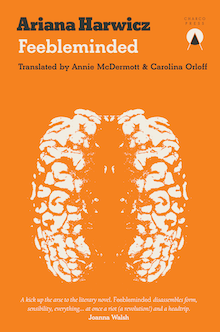 Feebleminded by Ariana Harwicz, translated from the Spanish by Annie McDermott and Carolina Orloff (Charco Press)
Feebleminded by Ariana Harwicz, translated from the Spanish by Annie McDermott and Carolina Orloff (Charco Press)
Maybe not the sexiest of all the sexy Charco covers—although it’s my favorite favorite color—but I’m already in on this, just like with The Hole. I loved Die, My Love and have been waiting to get my hands on this since the Guadalajara Book Fair. (Remember book fairs? Remember that joy?) Oh, and what’s this? “With a shocking, edge-of-the-seat finale worthy of Thelma & Louise if it were remade by David Lynch [. . .]” I MUST HAVE IT.
One of my tickler file essay ideas is simply called “10%?” I’m never going to write this, so let me burn it off right here: The general idea is that if certain books were 10% easier to read, or had 10% more marketing money behind them, or 10% more hearts on the ‘Gram, those books would be 1000% more successful. That a very minor change to the starting conditions makes a massive difference. Like the butterfly effect but more quantifiable and less about hurricanes. And I think this (imaginary!) equation works both ways: Make a book 10% more difficult, have 10% fewer built-in fans, and the book sells 1/100th of what it could have. I think about this when I think about Charco or New Directions doing our Spanish books. We have some stellar fucking authors; they get all the sales. If we could swap logos, I probably would be too satisfied and too high on sales to spend my Sunday night trying to give these other books/authors/translators/presses enough positive vibes so that 0.1% more people will actually read their books.
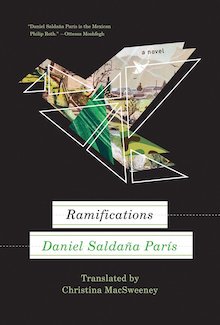 Ramifications by Daniel Saldaña Paris, translated from the Spanish by Christina MacSweeney (Coffee House Press)
Ramifications by Daniel Saldaña Paris, translated from the Spanish by Christina MacSweeney (Coffee House Press)
First off, become a member of Coffee House Press. I used my membership discount to finally finally get I Hotel by Karen Tei Yamashita. Would I Hotel be a good Two Month Review book? Let me know! Another book I haven’t read: Among Strange Victims by Daniel Saldaña Paris, but I love the cover of this new book so much (all three of my top October books are cover based, which is so very basic), know Christina, and am followed/liked by Daniel on at least one social media platform. Shit, I think I’m going to end up trying to read a lot of books this month. Including both of Saldaña Paris’s.
My neighbor across the street is probably in his late-fifties and lives with his mom. The only real interaction I had with them is when his (~70 year old) mom backed her car right up across her lawn and into their gas meter—resulting in multiple police cars and fire trucks converging to the scene, while she ran around the street yelling “Put that away, the whole place is going to blow!!!” at anyone who walked by with their phones in sight. But they fascinate me. Every chance I get—meaning between May and September, when Rochester isn’t fucking Canada—I sit on my porch in the morning, drink coffee, read, and watch them on their porch. Their house has two driveways—one on either side. The first one (on the left) is legit, was clearly designed to go with the house; the other was laid over top of their side yard, and has no slope leading to the street. If you tried to ride your bike up onto that driveway, you would hit a foot-high wall of asphalt. It’s . . . unique. Over the past five years I’ve lived here, the son has been out working on a car in the DIY driveway every chance he gets. He spray-paints newly fixed rust patches. Tinkers with the brakes. Does shit that seems like it’s just shit to stay out of his mom’s sight for a while. This will surprise no one who knows me, but I don’t really do that whole “work on cars” thing. I’m hazy on what type of car I have. It’s just not a status symbol or hobby that appeals to me. But, for the first time in YEARS, I took a moment to look at what kind of car my neighbor is working on, incessantly. It’s a shit-brown Geo Prizm. Only proving that hobbies are all about the process. I assume he gets as much joy working on that incredibly unremarkable car as I do on these posts. (Which are also shit-brown!)
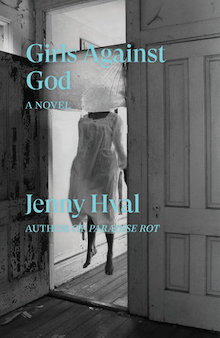 Girls Against God by Jenny Hval, translated from the Norwegian by [ummm] (Verso)
Girls Against God by Jenny Hval, translated from the Norwegian by [ummm] (Verso)
How did I not know that Verso was distributed by Penguin Random House? (Whose website lists no translator for this book. And I’m too tired to research further.) This is how you spell “my gods have died and I am so disappointed.” I’ve bought so many Verso books. (Mostly .mobi ebooks for $.99 if I’m being an honest hypocrite.) I want my indie presses to be 190% socialist, British hippies who are not part of the PRH Mega-Machine. God dammit. Although, on the flipside, nice move, British Socialist Hippies. The Devil is delivering messages about his desired doom to readers . . . who make the Devil a little more rich. Buy indie all day, in every medium. Verdict: Will only read if Tom Roberge records another podcast. (He’s a huge Hval fan; I like her music.)
I’ve often daydreamed of a world where I can revisit posts from last year (or the past few years) and simply update every single one of them. Most of everything is cyclical—life, society, baseball—and, I wonder if there aren’t hidden repetitions in the book world that could be teased out if we looked more closely. Sure, there’s “award season” and certain months that bring with them the biggest of the big releases, but do more subtle recurrences exist? Is it worth revisiting which publishers do the best Spanish literature every year? Is there a “close reading” of the publishing industry and culture that would yield interesting observations and/or minor truths? If anyone is in a place to speak to this, it’s Michael Orthofer, the most consistent producer of news and reviews that we have. He’s in touch in a way that the rest of us dream of being.
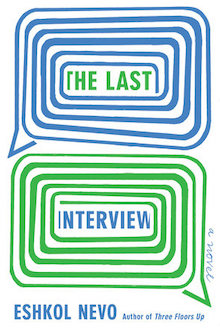 The Last Interview by Eshkol Nevo, translated from the Hebrew by Sondra Silverston (Other Press)
The Last Interview by Eshkol Nevo, translated from the Hebrew by Sondra Silverston (Other Press)
The thing that’s most irritating about PRH is that they don’t realize the MASSIVE advantage they have over other presses. They actually believe their “good work” is what sells books, and not the fact that they control, well, basically everything, When they buy Simon & Schuster? Well, then we don’t have a game anymore. They are Amazon on the publishing side of things, and, like Amazon, have swallowed the Crazy Kool-Aid they’ve been selling to the American public ever since they went from “boutique publisher concerned about art” to “multinational conglomerate buying up properties.” PRH is the 1% who pretend they’re middle class. They have a 375% advantage over everyone, yet try and present as “average hardworking folk.” Do not fall for this. If there’s one thing we learned in 2020, it’s that ALL unequal systems are unequal to an extreme degree.
Is this a Melville House book? (Also distributed by PRH and should check their privilege.) Sorry, that’s a bad joke. (And mean side-swipe.) This actually sounds intriguing to me, although it also reminds me of Amelie Nothomb’s Hygiene and the Assistant, but male and featuring only one character. (That totally tracks.) I haven’t read Nevo, but I feel like I should. Which is something else from my tickler file: Why do you feel compelled to read certain books and not others? Because of Twitter? Awards? Sales? Covers? I mean, that is the Golden Ticket question, which is why this is less of an idea about a post, and more of a wish that I could figure out the fucking Code of Success.
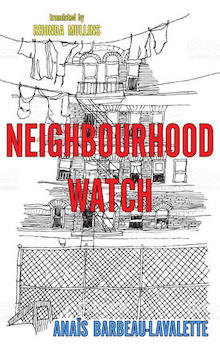 Neighbourhood Watch by Anais Barbeau-Lavalette, translated from the French by Rhonda Mullins (Coach House)
Neighbourhood Watch by Anais Barbeau-Lavalette, translated from the French by Rhonda Mullins (Coach House)
Every time I set out to write one of these posts, my intention is to highlight books from presses who get next to no attention. There’s no reason to highlight a Riverhead book, or even something from ND or FSG—they already get all the love. And I’m not personally here for that anymore. I love their books, truly, but I don’t want to be a lemming, saying nice things about the thing that everyone has already decided is amazing. BUT. I still use the same presses over and over and over. PAY ATTENTION TO DEEP VELLUM AND COACH HOUSE AND TRANSIT AND UNIVERSITY OF NEBRASKA. It’s all so predictable, yet necessary. Also: This book apparently comes out in November. I’ll repost about it next month.
So, Daniel Hahn was appointed as an Officer of the Order of the British Empire this past week for his “services to literature,” which, holy shit, congrats, Danny! You are one of the most caring, thoughtful, brilliant, devoted human beings I’ve ever met. You are my hero. You’ve accomplished every dream I’ve dreamt while being the kindest, most giving human being I know, who anyone knows. Danny: You’ve spent so many hours giving advice and/or just being there for everyone in ways that are in stark contrast to PRH. You are the soul of translation. Just the best. If you’ve met Danny, you know exactly what I mean. If you haven’t met him, I hope you do. And I also hope Michael Orthofer gets the American equivalent of—oh. Wait. This is America. We don’t have nice things like that. The measure of success in America is how much money you make. That’s so A Frolic of His Own. But putting our shitty country’s values aside for a second, why doesn’t the New Yorker do a feature on Michael? I can’t think of anyone who’s done more for international literature from 1998-2020 than he has.
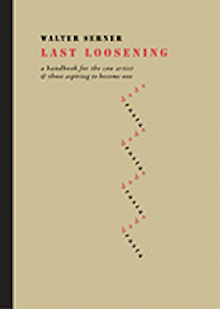 Last Loosening: A Handbook for the Con Artist & Those Aspiring to Become One by Walter Serner, translated from the German by Mark Kanak (Twisted Spoon Press)
Last Loosening: A Handbook for the Con Artist & Those Aspiring to Become One by Walter Serner, translated from the German by Mark Kanak (Twisted Spoon Press)
The first Twisted Spoon book I read was The Maimed by Hermann Unger, which I read before I went overseas for the first time in my life as part of an editorial trip to Berlin, Frankfurt, and Munich. I remember loving it; I also remember that no one else had even heard of him. Twisted Spoon is so interesting, and this book is perfect to dip into at random, when you’re procrastinating. Example: “285. Give little gifts often. As a result, no one will be able to hate you very much, and those who cannot be bribed will still be somewhat influenced by it.”
Have I already written about the ads for “Mirror”? I fucking HATE this. It’s a mirror that is also a screen that helps you work out. It came out pre-pandemic, but is a 255% pandemic product. Normal mirrors? They’re judgey as fuck. Who sees themselves and is like, “oh, yes, give me more of that”? You do? Really? Ok. Maybe this is another MeProblem. I see a mirror—or a clock—and see age. And death. Failure and ugly. I warned you from the jump that this post was going to go everywhere. I’ve been begging for “CoolSculpting therapy” for years. But seriously, I don’t need a mirror telling me to do more pushups. Seriously. Just fuck off, Mirror.
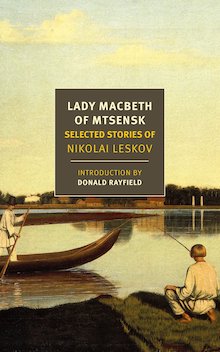 Lady Macbeth of Mtsensk: Selected Stories of Nikolai Leskov, translated from the Russian by Donald Rayfield, Robert Chandler, and William Edgerton (NYRB Classics)
Lady Macbeth of Mtsensk: Selected Stories of Nikolai Leskov, translated from the Russian by Donald Rayfield, Robert Chandler, and William Edgerton (NYRB Classics)
My only interest in this book is the Walter Benjamin reference in the copy. He’s been hovering over my life for the past few months, and every time I see his name, I realize that I should read/revisit his work. Otherwise? Another PRH client, and one that’s doing Dalkey’s Gaddis books. Which, if you haven’t heard the news, J R is going to be the featured book in the fourteenth (!?) season of the Two Month Review starting this December. In doing a bit of research on what I might want to revisit before rereading one of my favorite books of all time, I came across two things of note: 1) this site, which references Benjamin’s Art in the Age of Mechanical Reproduction, and 2) apparently I wrote about J R for the National Book Foundation ten-eleven years ago. What’s funny about that isn’t the fact that I forgot I did this, but that it’s almost exactly what I would say about A Frolic of His Own, which I’m reading for the first time now: “J R is the perfect novel for our new recession-driven world. Similar to Gravity’s Rainbow (which I wrote about earlier), this is another encyclopedic novel with dozens of characters, subplot upon subplot, quite literally overflowing with ideas, conversations, and detritus. And money. It’s all about money.”
One day I’ll write a post that breaks down translations into these buckets: U.S. Publisher is the only publisher, UK publisher is only publisher, UK publisher sells to U.S., and U.S. publisher sells to UK. Here’s my prediction of the ~600 books (which would be higher if option 3 didn’t dominate “US indie publishing”): 15%, 20%, 40%, 25%.
BTW, this whole post is based on Marcel Bénabou’s Why I Have Not Written Any of My Books, which is unfortunately out of print. I haven’t thought about this book in years, but in the early-2000s, Bénabou and Bison Books at the University of Nebraska Press were fire. Around the time that Nebraska was publishing these fun, funny, inventive Oulipian books, they also did Antoine Volodine, Marie Redonnet, Robert Walser, J. M. G. Le Clézio, Cristina Peri Rossi, Esther Tusquets, Éric Chevillard, Maryse Condé, Soledad Puértolas, Mercè Rodoreda, Louis-Ferdinand Celine, Boris Vian, and Marie NDiaye. They haven’t brought any translations out since 2015, but what a legacy! They were so far ahead of their time . . . which is cool, and yet, sucks, since they’ll never get the credit they deserve.

Leave a Reply